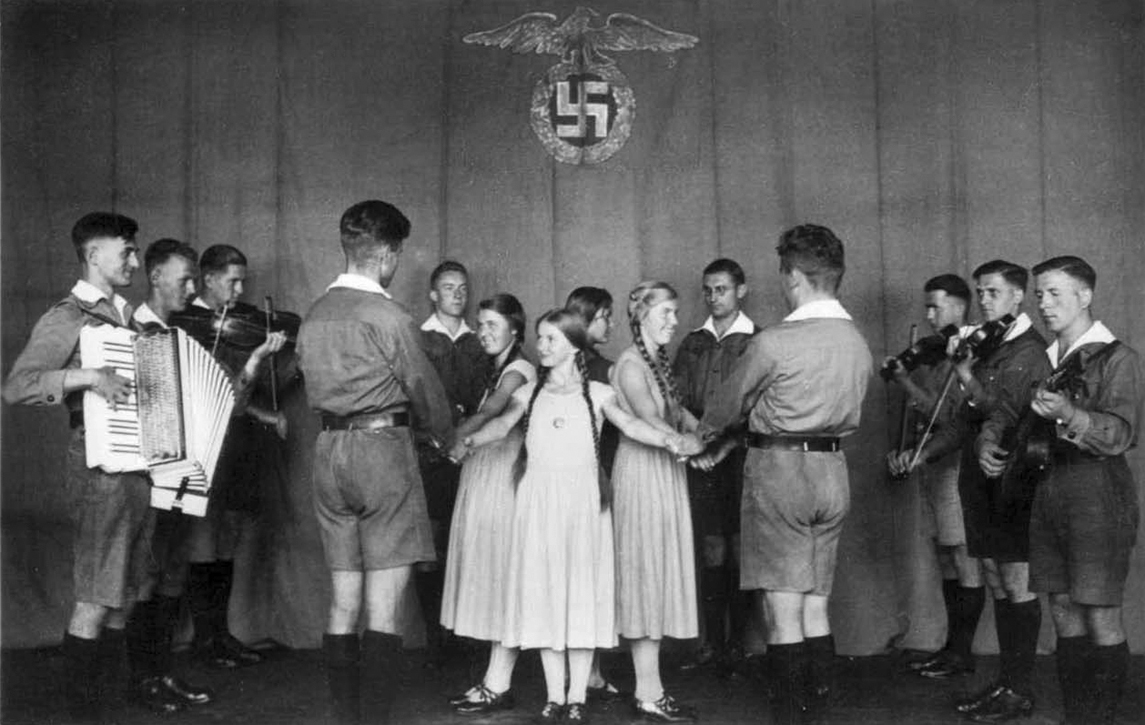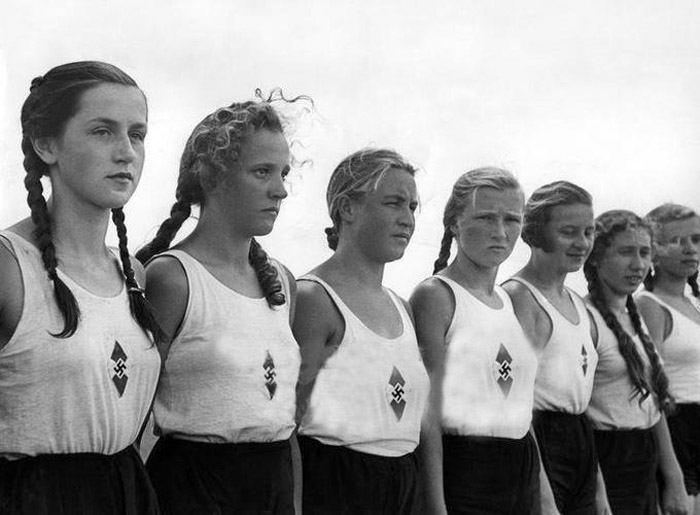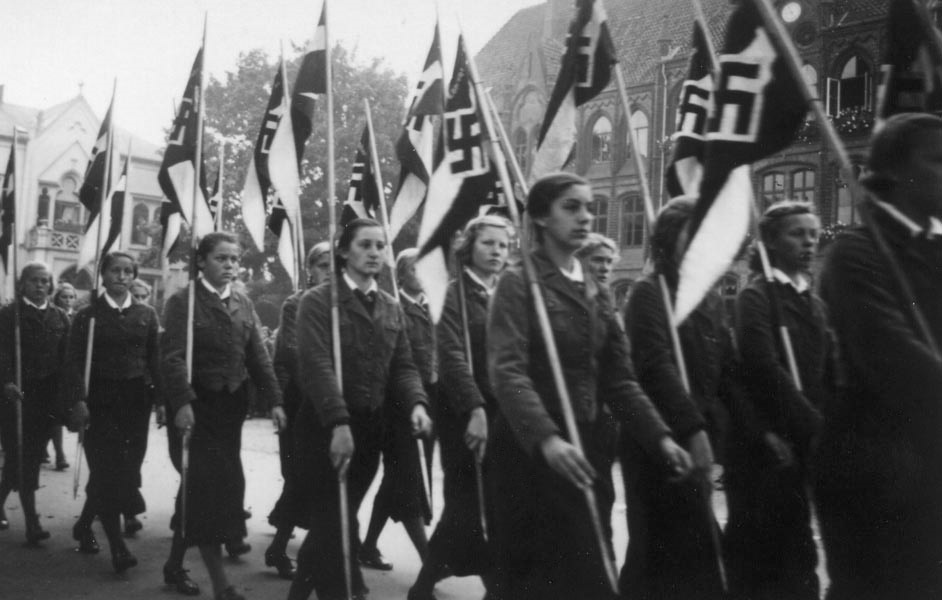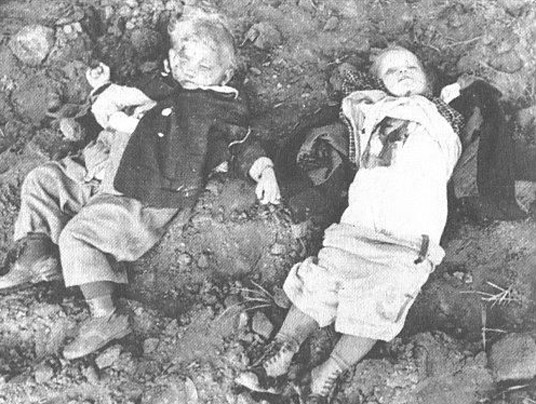Interview with Frau Lagerlof, witness to the Nemmersdorf Massacre, Germania Club, 1987
[Above: BDM girls dancing with Hitler Youth boys.]


Interview with Frau Lagerlof, witness to the Nemmersdorf Massacre, Germania Club, 1987
[Above: BDM girls dancing with Hitler Youth boys.]


Thanks for letting me ask you some questions about the war. Could I start by asking what it was like living in Tilsit [Former East Prussia, now a part of Russia since WWII and called Sovetsk-Ed.]?
FL: Absolutely, I can tell you all about my time there. My father was a railroad man, so we lived close to the rail station in Tilsit. This was a small town that was on the border with Lithuania; one could walk across the Memel River and go into another country.
My town was a very nice place to live back then, it no longer exists but only in my memory. In the summer we would go play in the river and use rafts or small boats, it was very fun for all of us.
We were close to the coast, so my father would take us out in the Haff [lagoon] and sail or fish, my brother loved fishing. I liked watching the fish swim and drawing them. The winters could be quite cold, but there was always something fun for a young girl to do.
Do you know anything about the border issues with Poland that led up to the war?
FL: Only what my parents would tell me. I understood there was much fighting around the area right after the first war. The Poles tried to take more territory, and this started several small wars in the Baltics and on Germany’s former borders. I know there was resentment felt by many Germans regarding the border clashes.
I remember my older brother could not wait to enlist in the armed forces to get back at the Poles. Many Germans felt the Poles had been emboldened by the WW1 allies and were quite mean to Germans living inside the new borders. I even heard of fights that would break out on the border between Germans and Poles, as the Poles tried to extort money before Germans could cross the border.
I even read in the papers that they fired on German planes at times. I believe if all this was the case, then it is no wonder that Hitler attacked Poland. I believe it was quite correct to end the problems that existed between the two countries. My father hated the Poles; he always said they were arrogant criminals.
In contrast I remember we had very good relations with the Lithuanians, and got along well. They would welcome us and we welcomed them. We freely traded with them, and they would be welcomed to set up stalls for selling foods and goods in our town fairs.
How did you feel when war was declared?
FL: You know I was still young then, I was in the BDM, and we had to postpone a special day of making food baskets for the harvest. We were all sent home and we listened to what was happening on the radio. My father told us he knew something was going on as they were hauling more military equipment than ever before.
I could swear I had heard booming in the far distance, but I am sure this was just my imagination. We had a militia and the local SA went on alert to protect the borders if something happened, and an army unit arrived outside town as well. I must admit it was pretty exciting for a youngster to see.
My father warned us to stay away from the train tracks as they could be bombed, but all we saw were German planes. My BDM group was assigned to make cards for the wounded and to thank our soldiers. I did see a wounded soldier who lived by the coast, he was on his way home to recover and a farmer was taking him on a cart.
It was a happy moment when victory was declared, the fear of it being a long war with Poland was gone. There was worry about England and France however. My brother was called up in October I believe, he chose the Luftwaffe, and went into the parachutists.
You mentioned he was part of the jumps into Crete?
FL: Yes he was, I always looked up to him and he made our family proud. He was the first to serve in the military, most all men worked on the railroad or farmed. He was in training all of 1939/40 it felt like. He came home for a leave after the victory over France; I remember he was very proud of a badge he got for jumping.
Then he was off to more training, I think he was a tank hunter and it took awhile to learn this skill. He was part of the action in the Balkans, and his regiment was sent to Greece, my poor mother was terrified something would happen to him, but he always joked about this fear.
He would say a bullet will not exist with his name on it. However my mother was terrified when in May 1941 she received a telegram that he was severely wounded in Crete, and was being moved to a hospital close to us. I remember the NSDAP party man coming to our home, he wore the swastika armband.
He told my parents there was nothing to worry about, and the Party would help anyway we needed. My BDM group kept making cards for our soldiers, and I was able to make a special one for my brother. He arrived at a nearby hospital and we got to go see him. He had broken ribs and a broken leg.
I will tell you, he was part of a jump that landed by Cretan civilians who took up arms and killed or beat German soldiers. He spoke very frankly with my father, saying he was lucky to be alive. He jumped and landed in a tree that broke his leg, and then civilians starting shooting at them.
He would say they did not shoot back at first because they were civilians, they thought it was the British shooting from hidden places. Many men were wounded or killed I remember him saying. Then when they realized it was civilians it was too late, they were upon them and started to shoot and beat them. He got loose of the tree, but was attacked by many men who kicked and beat him knocking him unconscious.
I heard him say most all his comrades were killed by these people. He came to later in the night but could not move. He had to stay quiet until German soldiers came upon him. They were enraged he said at what had happened and he had to give testimony to a general.
I remember he was upset that he had to stay on the island and identify the men who he saw attack his unit. He said they had had been given quick justice. In spite of all this he still laughed through his pain, and wanted to get back to his comrades. He was able to stay on light duty for the rest of the year, and was made some type of school instructor, he hated it.
He went on to fight in the east and in Italy, I remember seeing him in 1944, and he did not look the same. The war had aged him by many years. He spoke of the deceitful way the enemy fought, telling father they shot medics and the wounded. This did not help mother at all.
I said prayers for him every night I remember, the war was not going well and I was afraid he would never come home. He did survive it all though, he lived until 1980, always proud of his service time.
[Above: BDM girls.]

You mentioned you saw the Red Army do bad things in your area, can you tell me about it?
FL: Yes, it is hard to talk about but I want you to hear this. I was a teenage girl by 1944. I was still in the BDM, but it would be my last year. It was in late September of 1944, and the east front had been broken we were told. The local party and SA men all were telling the towns people to leave.
It was just my mother and I; father was part of the Reichsbahn and was away. The party leaders said we had to leave as the Red Army was quickly coming; this was in October I believe. We had no car, so we set off on foot carrying overnight bags. We could hear the sounds of battle in the distance, and I could tell this terrified my mother.
We saw what had to be hundreds of others on the road with us, and we took a wrong road, which took us south towards Gumbinnen instead of west. We stayed in a hotel that was abandoned and had been ransacked. I saw a Russian column go through and we thought we had had it, but they were quickly gone.
We set off to the west once my mother got her bearings; the goal was to get away as fast as we could. We were told to stay off the roads and hide in the woods as the Russians were shooting at anything on them. I saw this with my own eyes; a plane hit a big cart with children as we watched from the woods.
We took a road south and came to a small town; there had been a recent battle there. The army had retaken it when we arrived and there were signs of fighting all over, I saw dead soldiers for the first time.
I asked my mother if we should take a weapon but she would have none of that. We were met by soldiers who asked where we came from. They told us to keep moving fast, and that we should shield our eyes. They said many children were murdered, and some were nailed up as if on a cross, so do not go down this lane.
I remember seeing a small bridge with many dead, we moved fast to get through the town quickly. I had that young curiosity, so of course I was very observant. I saw bodies lying in fields and in the street. I saw homes that were ransacked, with broken windows. I saw a portrait of Hitler that was riddled with holes and had boot marks on it.
We came across more German soldiers, who yelled at us to keep moving and get away. I remember one crying out 'they killed all the civilians'; and had to be controlled, he must have been from the area. As we moved on, I saw groups of soldiers looking over the dead; I could make out the bodies of children.
I could hear soldiers talking to a man who said the Russians came through and killed everyone they could. I remember seeing books, papers, and furniture strewn everywhere, the Church was ransacked, and the Cross was thrown in the dirt. I remember asking myself what kinds of people do these things?
As we made it away from there we ran into another mother/daughter pair who were quite shaken, the girl had been attacked by Russians, she and her mother were bloody. They said German soldiers saved them from death, but they did not speak German.
We helped clean them off and agreed to go together to seek help. Later that day we came across a Red Cross truck with medical people. We stopped to get a drink of water and they offered what little food they had, but we had no appetite. My mother asked what had happened and the soldiers said the town had been taken by the Russians and they killed everyone, even babies and animals.
I remember being so numb and sick to see all of this, my innocent youth was gone at that point. I saw things that no one should ever see. There were shot up carts and buggies along the road we were on. The Russians attacked the civilians who were only trying to get away from the war. They were no threat to them at all, yet they killed them.
I saw dead animals, and every so often a corpse no one had time to bury. There had to be hundreds along the way. The Russians were truly showing how evil they could be. I have heard that they did this because their propaganda minister told them to.
Do you feel the Germans are portrayed fairly in the media, considering the side of the war you saw?
FL: Heavens no, things are very unfair for us. We had no knowledge of what was happening but we are held liable for it all. After the war they told us to be ashamed of what we had done, but I always thought to myself that I had done nothing wrong, yet people wanted to kill me. I saw with my own eyes the crimes of our enemies, yet they say we should be guilty.
It is sickening that the war happened, and I hear people say 'Germans deserved it', this is absurd. You can not decry one atrocity and yet praise another because it was from the supposed good guys. I love this country [The United States-Ed.] but sometimes I wonder just how dumb-minded people are becoming. You know what, we never got to go back home, and the Russians either killed every German, or forced them west. No Germans live in that area any longer I am told.
This, in my mind, was a war crime that was unequaled in its vileness, as they went out of their way to target the civilians.
But let’s not talk about German suffering though; we must focus on what we did to the Jews and others. It makes me mad that people can be so hypocritical, blame Germans for things that may not have happened, but brush aside the real crimes.
They portray Germans as dumb boobs who only goosestep and blindly obey orders. They claim the BDM was a baby making club for the SS, which I can assure you it was not. I never thought of myself as a master race, and we were never taught that anywhere. We actually were taught to be quite humble and to love and help others in need.
Germany was not an ungodly nation either, as they claim. Most everyone went to church and was very pious. I remember hearing Hitler and others give prayers on the radio, God was a big part of our culture. They never tell about the crimes that were committed against Germans, and there were many. I know many people who witnessed acts of Allied crimes, but we are told to be silent.
[Above: BDM girls on the march.]

'At the edge of town, on the left side of the road, stands the large inn ‘Weisser Krug’... In the farmyard further down the road stood a cart, to which four naked women were nailed through their hands in a cruciform position. Behind the Weisser Krug towards Gumbinnen is a square with a monument to the Unknown Soldier. Beyond is another large inn, ‘Roter Krug’. Near it, parallel to the road, stood a barn and to each of its two doors a naked woman was nailed through the hands, in a crucified posture. In the dwellings, we found a total of seventy-two women, including children, and one old man, 74, all dead... all murdered in a bestial manner, except only for a few who had bullet holes in their necks. Some babies had their heads bashed in. In one room we found a woman, 84 years old, sitting on a sofa... half of whose head had been sheared off with an axe or a spade... We carried the corpses to the village cemetery where they lay to await a foreign medical commission...
In the meantime, a nurse from Insterburg came, a native of Nemmersdorf, who looked for her parents. Among the corpses were her mother, 72, and her father, 74, the only man among the dead. She also established that all the dead were Nemmersdorfers. On the fourth day the bodies were buried in two graves. Only on the following day did the medical commission arrive, and the tombs had to be reopened. Barn doors were set on blocks on which to lay the bodies so that the commission could examine them. This foreign commission unanimously established that all the women, as well as the girls from eight to twelve years and even the woman of 84 years had been raped. After the examination by the commission, the bodies were again buried.'
-Karl Potrek's report, a civilian from the capital city of Königsberg recruited into the Volksturm.
'When in October, 1944, Russian units temporarily entered Nemmersdorf, they tortured the civilians, specifically they nailed them to barn doors, and then shot them. A large number of women were raped and then shot. During this massacre, the Russian soldiers also shot some fifty French prisoners of war. Within forty-eight hours the Germans re-occupied the area.'
--Testimony of the former chief of staff of the German Fourth Army, Major General Erich Dethleffsen, on July 5, 1946 before an American tribunal in Neu-Ulm.
[Above & below: Victims of the horrid Nemmersdorf Massacre. The United States will always have the blood of millions of innocents on its hands, after all it was the USA that kept the communist monster alive during WWII, while Germany and its European Allies tried with every ounce of strength they had to defeat it. Which they would have done, if not for the USA's Lend Lease program. According to The Black Book of Communism', communism is responsible for the deaths of almost 100 million people around the world. Good job USA.]
